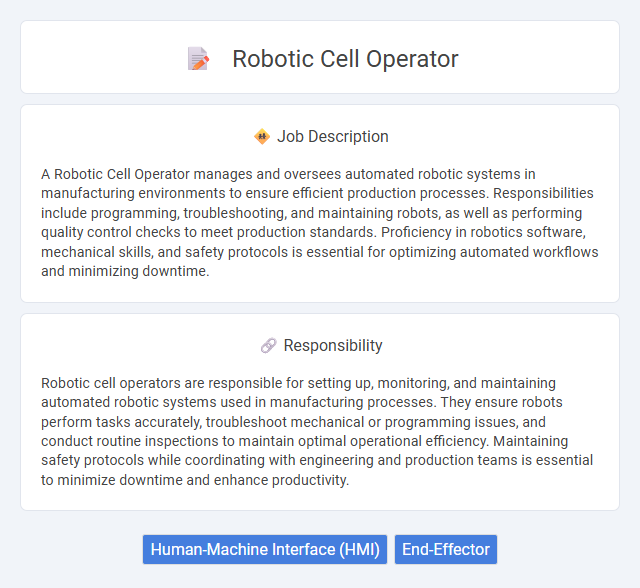
A Robotic Cell Operator manages and oversees automated robotic systems in manufacturing environments to ensure efficient production processes. Responsibilities include programming, troubleshooting, and maintaining robots, as well as performing quality control checks to meet production standards. Proficiency in robotics software, mechanical skills, and safety protocols is essential for optimizing automated workflows and minimizing downtime.
People with strong attention to detail and mechanical aptitude may be well-suited for the role of a robotic cell operator, as the job likely requires monitoring and maintaining automated systems. Individuals who can handle repetitive tasks and troubleshoot technical issues under pressure probably have a higher chance of success. Those who prefer dynamic, varied work environments might find the role less suitable due to the structured and process-driven nature of the job.
Qualification
A robotic cell operator typically requires a high school diploma or equivalent, with specialized training in robotics, automation, or manufacturing technology highly valued. Proficiency in programming languages such as PLC, knowledge of CNC machinery, and experience with robot maintenance and troubleshooting enhance job readiness. Strong analytical skills, attention to detail, and the ability to interpret technical manuals are essential for efficient operation and problem resolution in automated manufacturing environments.
Responsibility
Robotic cell operators are responsible for setting up, monitoring, and maintaining automated robotic systems used in manufacturing processes. They ensure robots perform tasks accurately, troubleshoot mechanical or programming issues, and conduct routine inspections to maintain optimal operational efficiency. Maintaining safety protocols while coordinating with engineering and production teams is essential to minimize downtime and enhance productivity.
Benefit
Robotic cell operator jobs likely offer significant benefits including hands-on experience with advanced automation technology and opportunities for skill development in robotics programming and maintenance. These positions probably provide competitive wages and potential for career growth in the expanding field of industrial automation. Employees in this role may also enjoy improved workplace safety by working with automated systems that reduce manual labor risks.
Challenge
The role of a robotic cell operator likely involves navigating complex machinery and software, presenting continuous technical challenges that require quick problem-solving skills. Operators probably face the difficulty of maintaining high precision and efficiency while troubleshooting unexpected malfunctions. Adapting to rapidly evolving automation technologies may also pose significant challenges that demand ongoing learning and adaptability.
Career Advancement
Robotic cell operator roles provide essential hands-on experience with automation technology, paving the way for career advancement into robotics programming and maintenance engineering. Mastery of industrial robotics systems and troubleshooting techniques equips operators for supervisory positions and specialized technical certifications. Employers value these skills, enabling faster promotions and opportunities in automation system design and integration.
Key Terms
Human-Machine Interface (HMI)
Robotic cell operators utilize Human-Machine Interface (HMI) technology to monitor and control automated manufacturing cells, ensuring seamless communication between operators and robotic systems. Expertise in HMI software allows operators to efficiently adjust machine parameters, troubleshoot issues, and optimize production workflows in real time. Proficiency in interpreting HMI data enhances operational efficiency, minimizes downtime, and supports predictive maintenance in high-tech industrial environments.
End-Effector
A Robotic Cell Operator specializes in managing and maintaining robotic systems, with a strong focus on the End-Effector, the crucial component interacting directly with materials or products. Mastery in calibrating and troubleshooting End-Effectors ensures precision in tasks such as gripping, welding, or assembly within automated production lines. Proficiency in understanding various End-Effector types, including grippers, suction cups, and welding torches, enhances operational efficiency and product quality.
 kuljobs.com
kuljobs.com